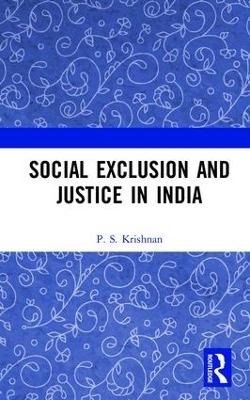
Social Exclusion and Justice in India
Routledge India (Verlag)
978-1-138-23983-8 (ISBN)
re-examines the Gandhi–Ambedkar debate.
analyses legal, economic, social and cultural frameworks available to understand caste system, address its evils and establish holistic social equality.
This book draws upon nearly seven decades of first-hand experiences from the ground to understand social exclusion, and movements and efforts for social justice in India. The author, a renowned champion of social justice for deprived social classes, delves into the roots of discrimination in Indian society as well as explains why caste discrimination still persists and how it can be effectively countered. The volume:
examines the caste system and its socio-economic ramifications from the perspective of Dalits, and Socially and Educationally Backward Classes;
explores the nuances of the Gandhi–Ambedkar debate on the status and liberation of Dalits and synthesis of the approaches of Gandhi, Ambedkar, Narayana Guru and Marx in resolving certain key issues;
analyses legal, economic, social and cultural frameworks to understand caste system and related concepts such as ‘untouchability’, atrocities, reservation, etc. in contemporary India; and
provides practical insights into the Constitution-based comprehensive measures required to remedy the consequences of caste system and establish social equality in a holistic manner.
The book will interest scholars and researchers of social exclusion and social justice, Dalit, Adivasi and Backward Classes studies, sociology and social anthropology, politics, law and human rights, as well as policy-makers, think tanks and NGOs in the field.
P. S. Krishnan is a former member of the Indian Administrative Service (IAS) and has been actively working for the cause of the advancement and empowerment of the deprived social categories of Indian society, the Scheduled Castes, Scheduled Tribes and Backward Classes, for over nearly seven decades including his 35-year career in the IAS. He has been Secretary, Ministry of Welfare, Government of India; Member, National Commission for Scheduled Castes and Scheduled Tribes; Member-Secretary, National Commission for Backward Classes; and Chairman/Member of different Steering Committees and Working Groups of India’s Planning Commission. He has been Honorary Advisor to the central government and certain State governments in matters relating to the disadvantaged social categories and guides many social organizations and activists. He has published books, papers and articles extensively.
List of tables. Preface. 1. Theme Paper on Dalits 2. Synthesis of Visions for Dalit Liberation and Empowerment: Gandhi, Ambedkar, Narayana Guru, Marx 3. Human Rights of Scheduled Castes, Scheduled Tribes and Socially and Educationally Backward Classes 4. Indian Social Justice versus American Affirmative Action and the Case of Higher Education 5. Scheduled Castes and Scheduled Tribes (Prevention of Atrocities) Act, 1989, Amending Ordinance and Bill 2014: History and Development 6. Laws and Schemes for the Rights of Scheduled Castes and Scheduled Tribes: Gap Between Constitutional Mandates and Legislative Enactments and Executive Actions 7. Scheduled Castes (SCs), Scheduled Tribes (STs), Socially and Educationally Backward Classes and Budget 2014–15. Index
| Erscheinungsdatum | 17.08.2017 |
|---|---|
| Zusatzinfo | 24 Tables, black and white |
| Verlagsort | London |
| Sprache | englisch |
| Maße | 138 x 216 mm |
| Gewicht | 453 g |
| Themenwelt | Recht / Steuern ► EU / Internationales Recht |
| Recht / Steuern ► Öffentliches Recht ► Völkerrecht | |
| Sozialwissenschaften ► Politik / Verwaltung | |
| Sozialwissenschaften ► Soziologie | |
| ISBN-10 | 1-138-23983-6 / 1138239836 |
| ISBN-13 | 978-1-138-23983-8 / 9781138239838 |
| Zustand | Neuware |
| Haben Sie eine Frage zum Produkt? |
aus dem Bereich


